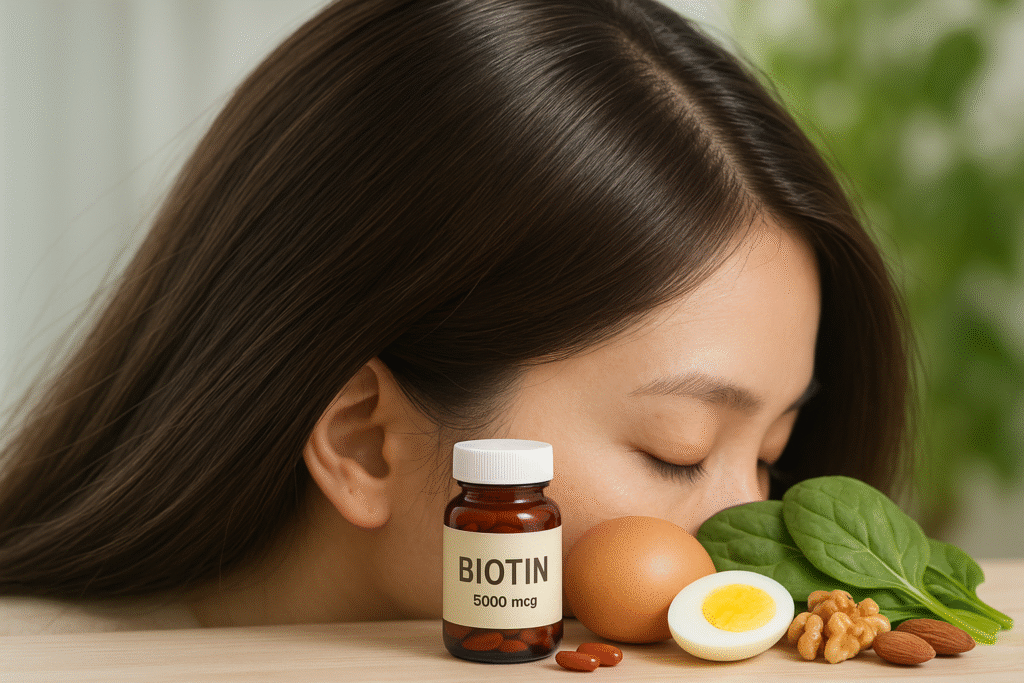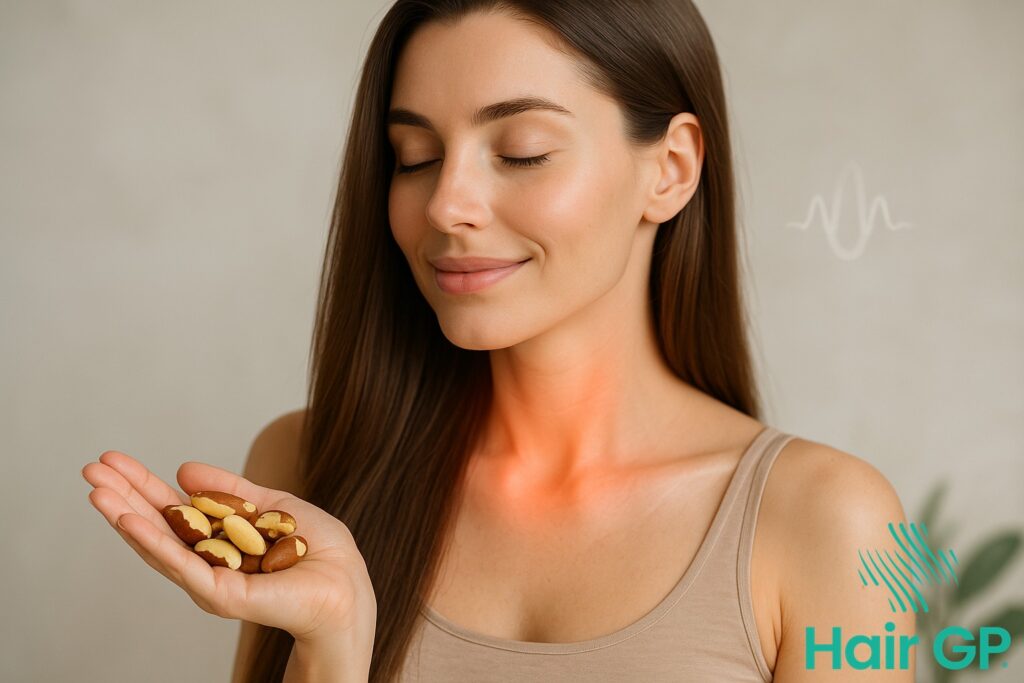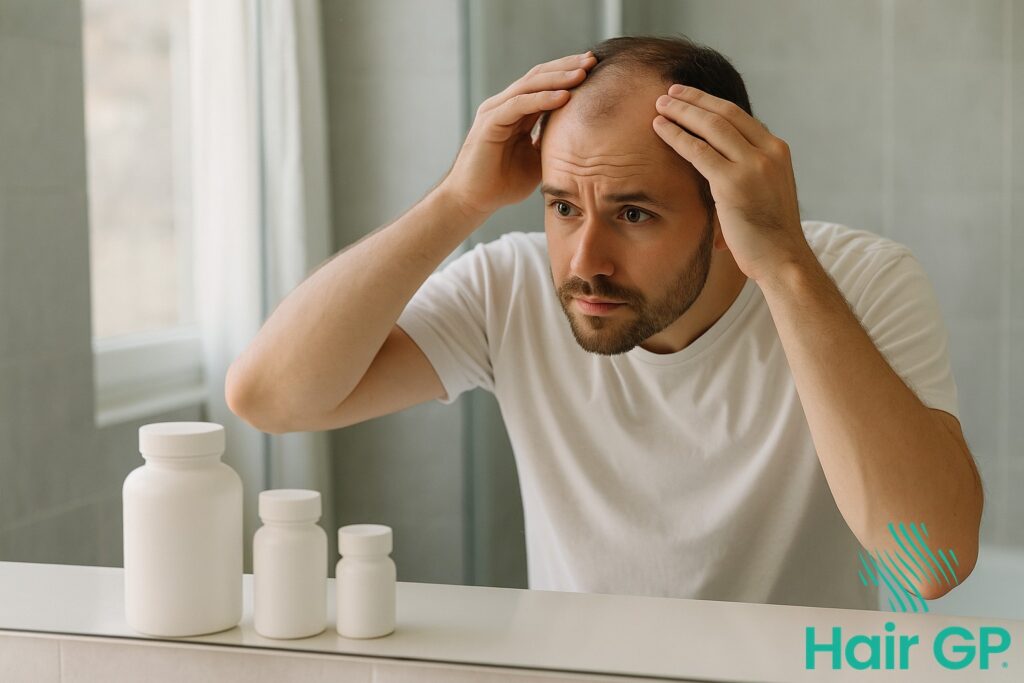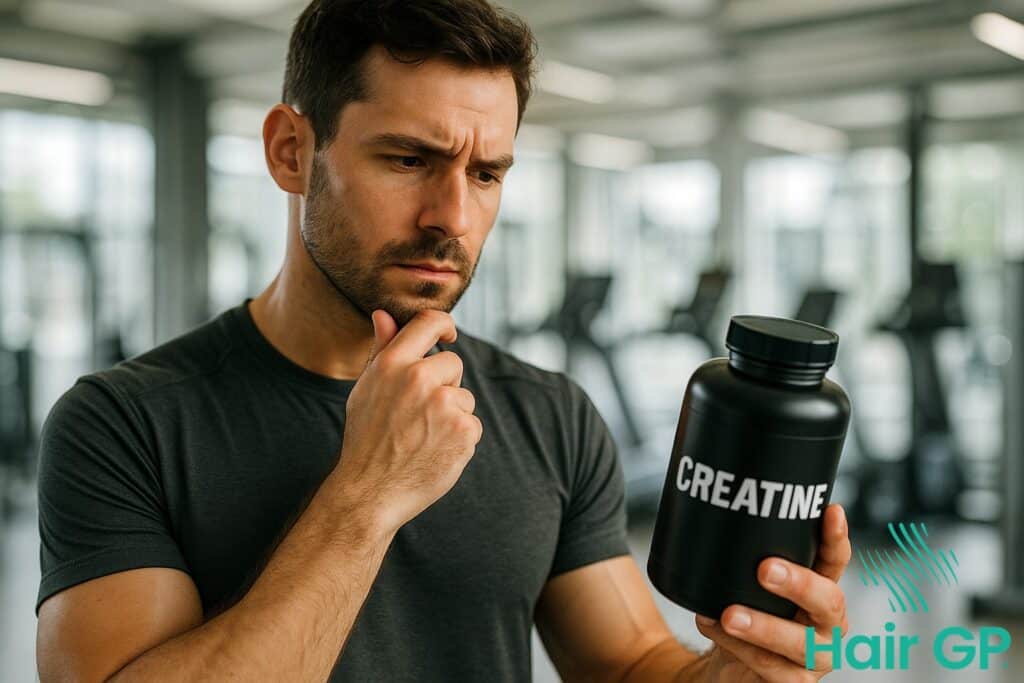Hair loss can be distressing, leading many to explore natural remedies like biotin supplements. This article examines whether biotin truly helps with hair loss and explores the science behind this popular supplement.
Is Biotin Good for Hair Loss? Understanding Hair Loss Solutions
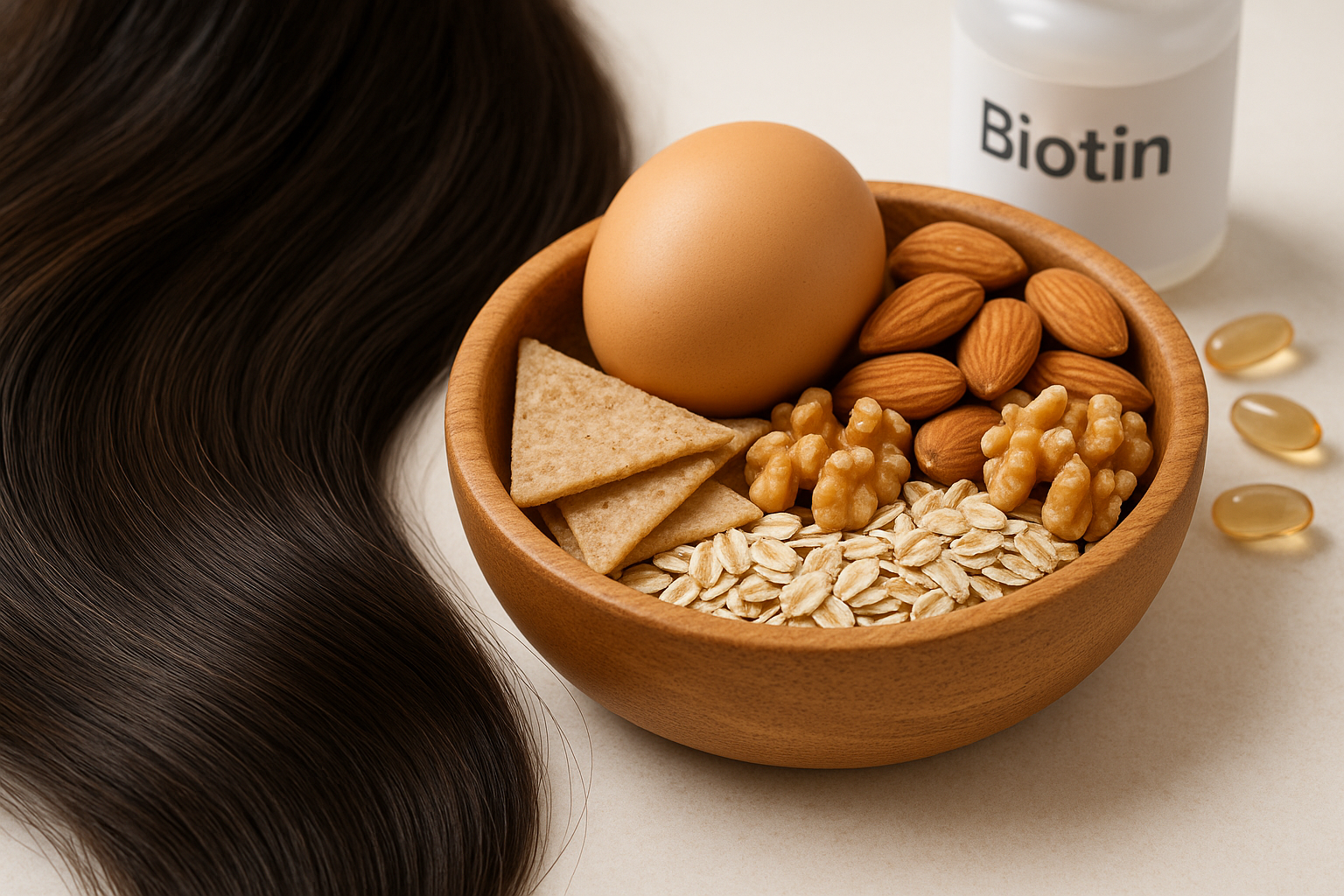
A close-up of shiny, healthy hair alongside a bowl of nourishing foods, celebrating the natural connection between diet and hair vitality.
When searching for natural remedies for thinning hair, you’ll likely encounter biotin as a popular suggestion. But is biotin good for hair loss? The relationship between biotin and hair health deserves a closer look.
Biotin (vitamin B7) plays a crucial role in maintaining healthy hair by supporting keratin production—the protein that forms your hair’s structure. For individuals with biotin deficiency, supplementation can indeed improve hair quality and potentially reduce shedding. However, most people get sufficient biotin from their diet through foods like eggs, nuts, and whole grains.
Research on biotin for hair loss shows mixed results. While biotin supplements won’t likely regrow hair in pattern baldness cases, they may strengthen existing strands and improve overall hair health. Many users report less breakage and improved texture after consistent biotin supplementation.
If you’re considering biotin for hair, start with realistic expectations. Typical doses range from 2,500-10,000 mcg daily, though you should consult your healthcare provider before beginning any supplement regimen. Results typically take 3-6 months of consistent use to become noticeable.
Remember that biotin isn’t a miracle cure—especially for genetic hair loss. For comprehensive results, consider combining a balanced diet instead with other proven treatments like minoxidil or finasteride (with prescription). The best approach to hair loss typically involves addressing multiple factors including nutrition, stress management, and proper hair care alongside targeted treatments.
Hair Loss Causes and How Biotin May Help
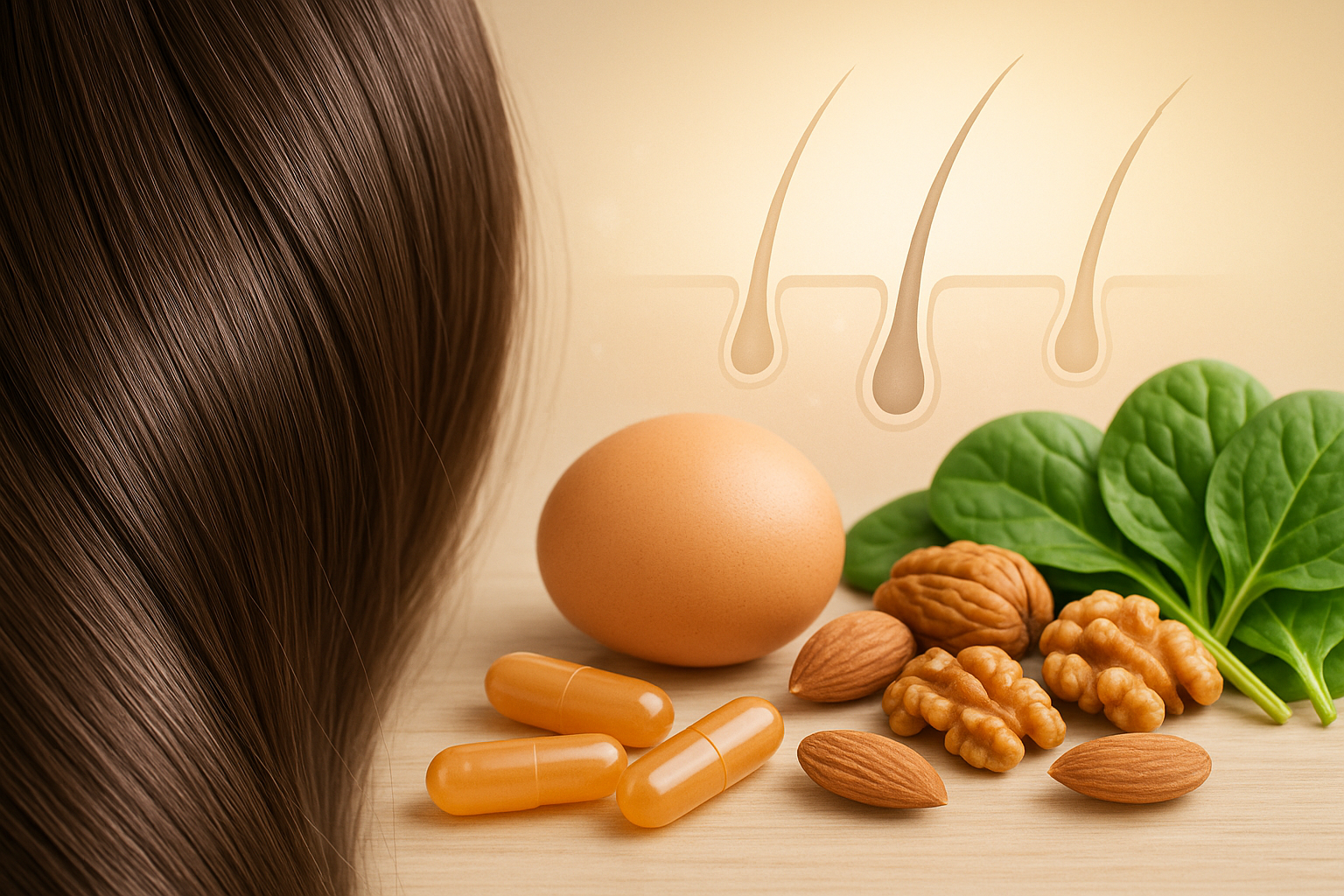
Glossy, healthy hair shines beside wholesome foods and supplements in a bright, uplifting setting.
Hair loss affects millions of people worldwide and can stem from various factors including genetics, hormonal changes, stress, nutritional deficiencies, and certain medical conditions. When your locks start thinning, it’s natural to search for solutions, and biotin for hair loss often appears in conversations about natural remedies.
But is biotin good for hair loss? The science suggests it might be, particularly for those whose thinning stems from deficiencies. Biotin (vitamin B7) plays a crucial role in the health of your hair, skin, and nails by helping convert nutrients into energy and supporting keratin production—the protein that forms the structure of hair.
While severe biotin deficiency is rare, even mild shortages may contribute to hair thinning. This is where biotin supplementation comes into play. Many people report improved hair thickness and reduced shedding after adding biotin supplements to their daily routine.
However, it’s worth noting that biotin for hair works best when addressing an underlying deficiency, which is very rare. If your hair loss stems from other causes, biotin might help improve overall hair quality but may not completely reverse the loss. For comprehensive results, instead of biotin supplements ensuring you have a balanced diet rich in proteins, healthy fats, and other hair-supporting nutrients like vitamins A, C, D, and E is a better way to go.
How Biotin Deficiency Symptoms Affect Your Hair Health
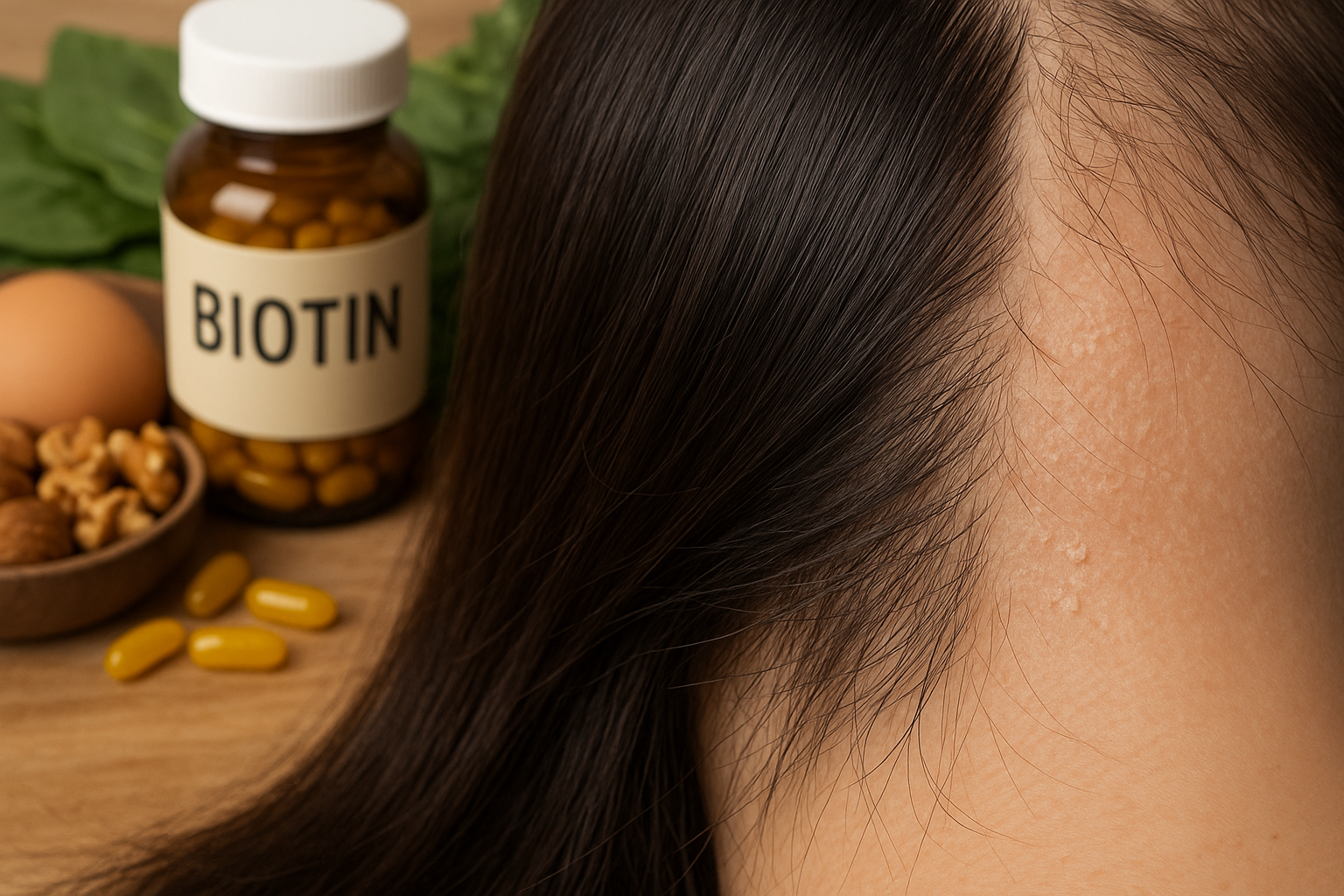
A hopeful moment as healthy strands begin to outshine thinning areas, surrounded by nourishing foods and supplements.
Biotin deficiency can significantly impact your hair health, often manifesting as thinning hair or increased shedding. The most noticeable symptoms of biotin deficiency include brittle hair that breaks easily, excessive hair loss, and slow hair growth. You may also experience biotin deficiency through other warning signs like dry, flaky scalp and diminished hair luster.
When your body lacks sufficient biotin, hair follicles can’t function optimally, leading to weakened hair structure. This essential B-vitamin helps produce keratin, the protein that forms your hair’s building blocks. Without adequate biotin, this process falters, resulting in compromised hair integrity.
Many people turn to biotin supplementation when facing these issues. While biotin for hair loss has become a popular remedy, it’s most effective when addressing an actual deficiency. Before starting supplements, consider consulting with a healthcare provider to determine if your symptoms truly stem from low biotin levels. For those with confirmed deficiencies, proper supplementation often leads to noticeable improvements in hair strength and growth within several months.
How Biotin Supplements Support Hair Growth: Types and Dosage Guide
Biotin supplements have gained significant popularity among those seeking solutions for thinning hair. As a B-vitamin essential for keratin production—the protein that makes up hair—biotin for hair loss has become a go-to remedy for many struggling with shedding strands.
When considering taking biotin supplements, it’s important to understand the available forms. You’ll find biotin as standalone capsules, gummies, or within hair-focused multivitamins. The typical recommended dosage ranges from 2,500 to 5,000 mcg daily, though some may benefit from higher amounts under professional guidance.
So, is biotin good for hair loss? Research suggests it only really works for those with an underlying deficiency, which can cause brittle nails, thinning hair, and skin issues. While not everyone experiences dramatic results, many users with a known deficiency report improved hair thickness and reduced shedding after 3-6 months of consistent use.
When shopping for biotin for hair, look for supplements with clean ingredients and third-party testing. Some enhanced formulations combine biotin with complementary nutrients like zinc and vitamin D for comprehensive support. Remember that biotin supplements work gradually—consistency is key for noticeable improvements in hair strength and volume. As with any supplement, consult your healthcare provider before starting, especially if you’re taking medications or have existing health conditions.
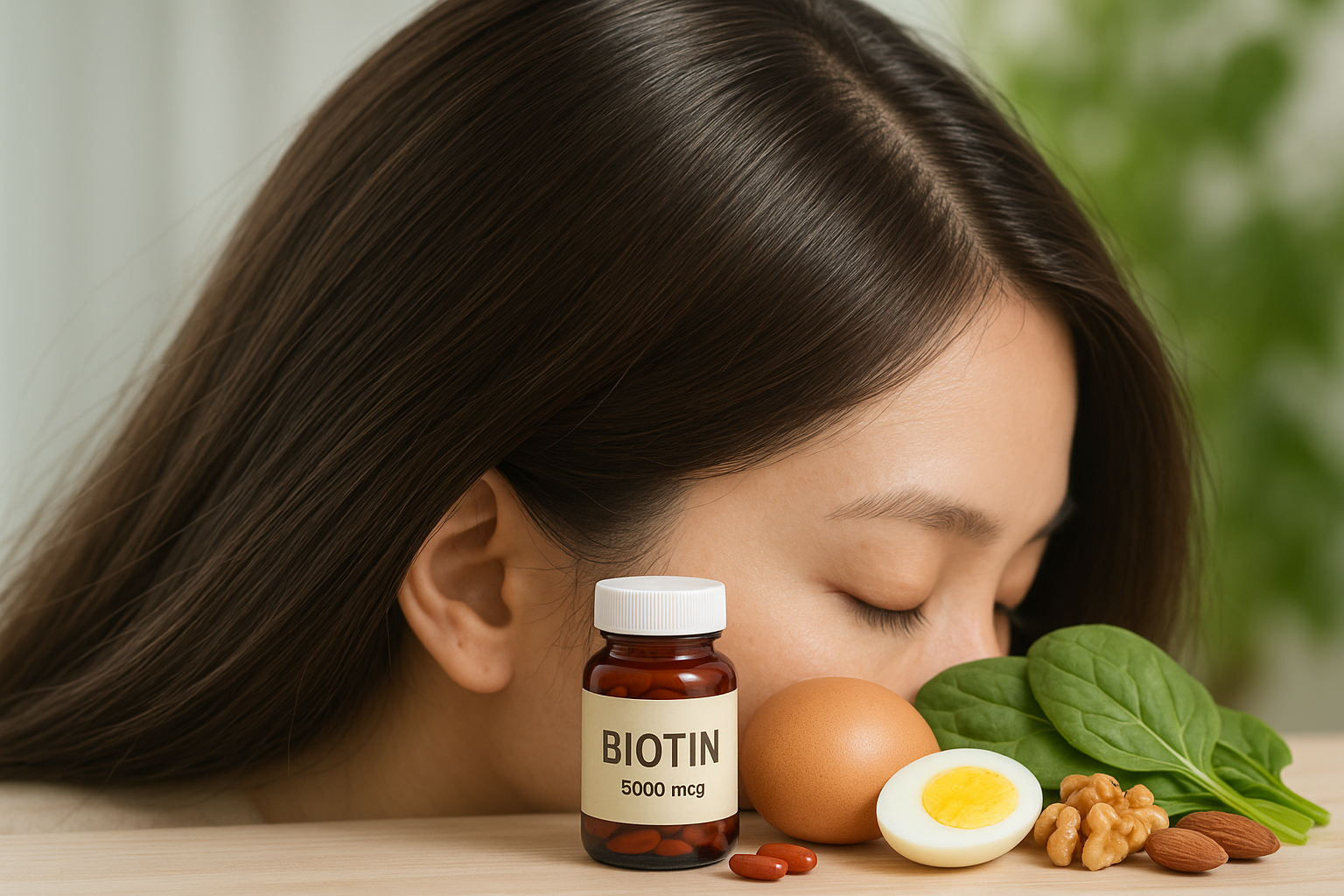
A close-up of glossy, healthy hair shines beside fresh foods that support natural beauty.
Best Biotin Rich Foods and B Vitamin Sources for Hair Growth
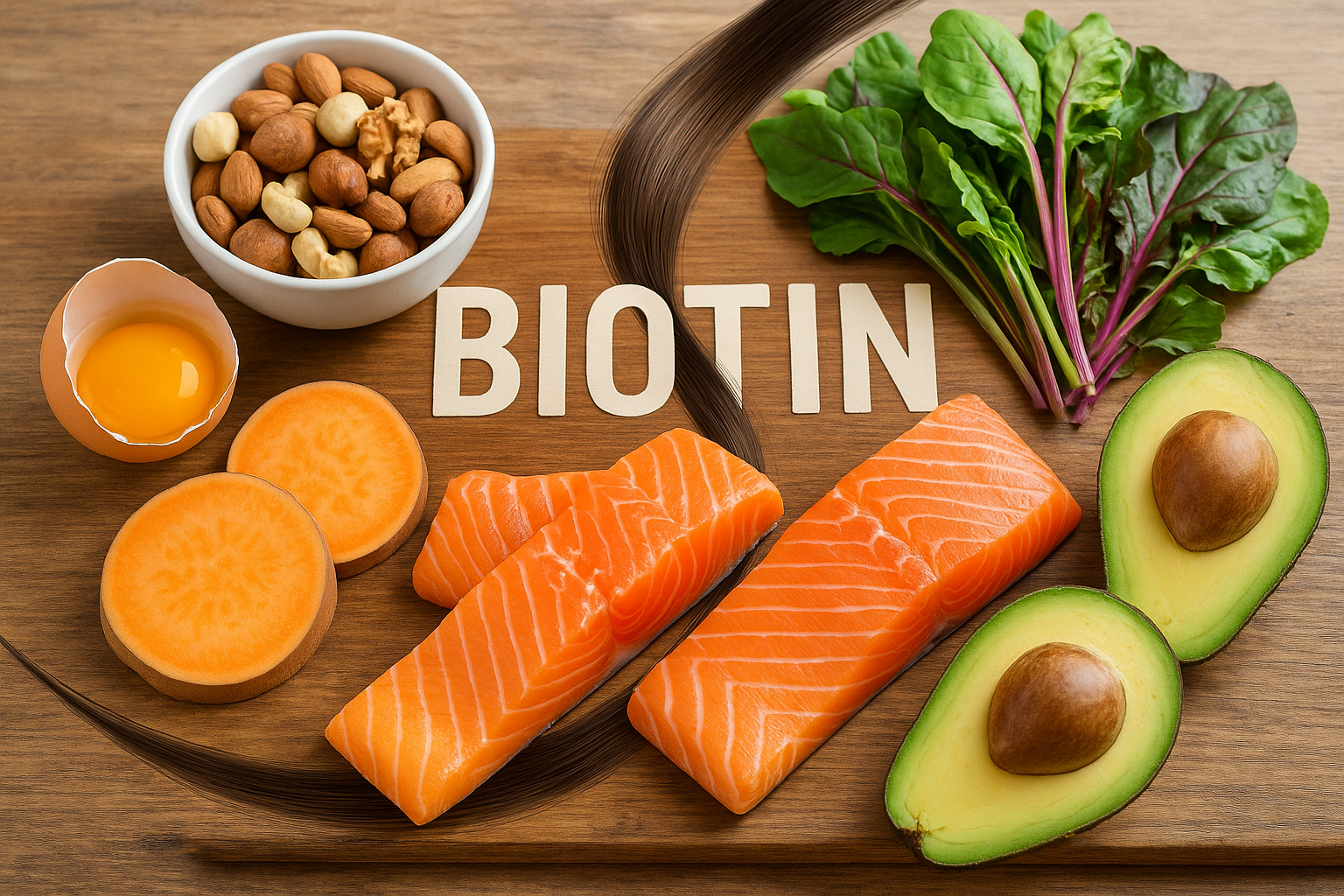
A colourful spread of fresh, nourishing foods brings a sense of vitality to the table.
Nourishing your hair from the inside out is one of the most effective strategies for combating hair loss. Biotin rich foods should be at the top of your grocery list if you’re concerned about thinning hair. This essential B vitamin (B7) plays a crucial role in keratin production—the protein that forms the structure of your hair.
If you’re wondering “is biotin good for hair loss?” the answer is a resounding yes. Regular consumption of eggs, nuts, sweet potatoes, salmon, avocados, and leafy greens can naturally boost your biotin levels. These foods not only support hair growth but also improve its strength and shine.
While biotin rich foods for hair loss are widely recommended by dermatologists, remember that consistency is key. For those with significant deficiencies (which is very rare), biotin supplementation might be necessary alongside dietary changes. However, most people can achieve optimal levels through food alone. The beauty of focusing on biotin for hair health is that these nutrient-dense foods offer multiple benefits beyond just improving your locks!
Effective Hair Loss Treatments and Alternatives Beyond Biotin
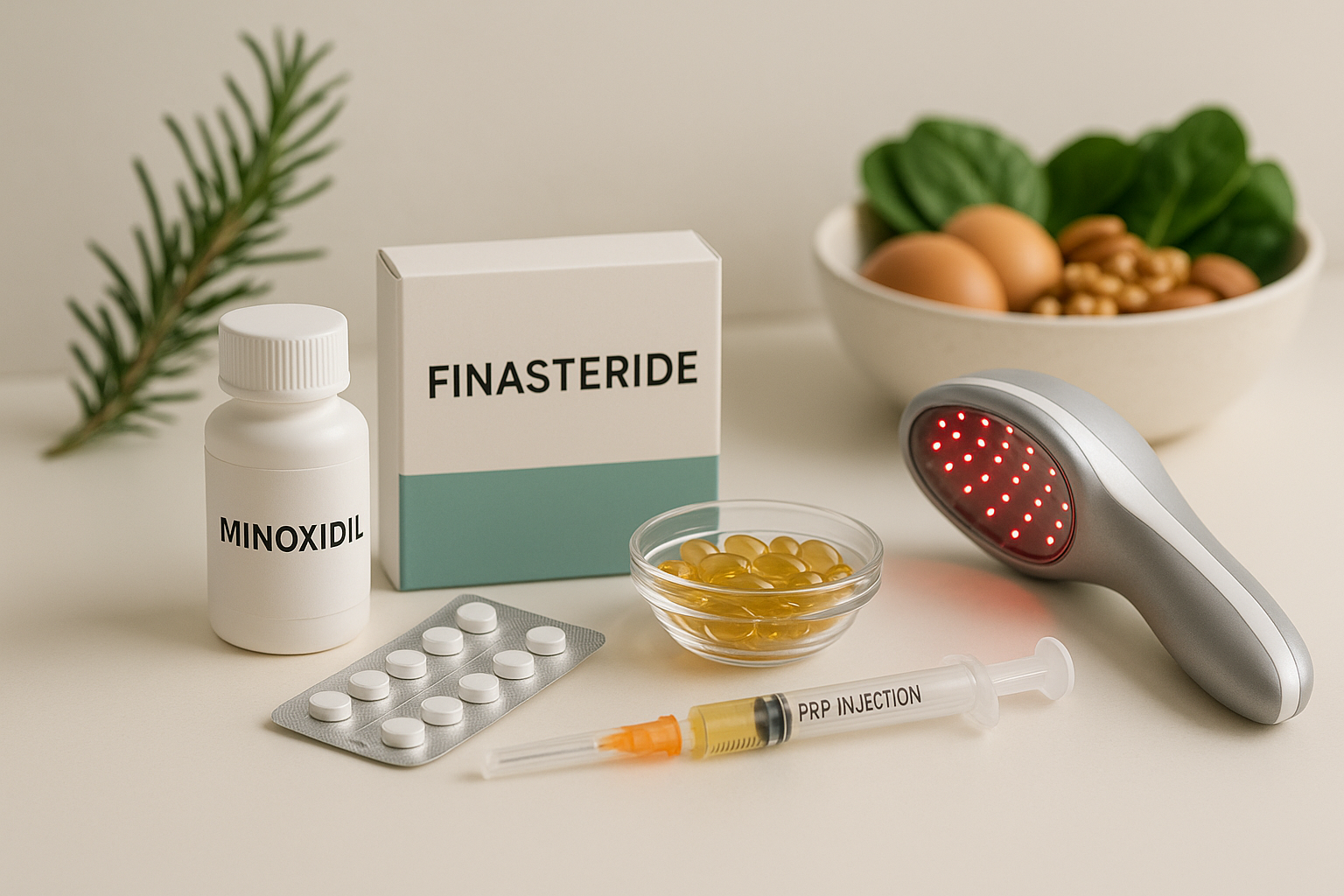
A bright, organized vanity displays everyday essentials alongside wholesome foods, creating a welcoming sense of well-being.
When exploring hair loss treatments, many people immediately reach for biotin supplements. But is biotin good for hair loss? While biotin deficiency can contribute to thinning hair, most people get sufficient amounts through their diet. This has many experts rethinking biotin therapy as a first-line approach.
More effective options include FDA-approved treatments like minoxidil (Rogaine) and finasteride (Propecia), which have substantial clinical evidence supporting their efficacy. Prescription-strength solutions often deliver better results than over-the-counter alternatives, especially for pattern baldness.
Beyond medications, advanced therapies like platelet-rich plasma (PRP) injections harness your body’s natural growth factors to stimulate hair follicles. Low-level laser therapy devices have also shown promising results for certain types of hair loss without significant side effects.
Don’t overlook lifestyle factors either. Stress management techniques, balanced nutrition, and gentle hair care practices can complement medical treatments. Some dermatologists recommend topical essential oils like rosemary, which research suggests may rival minoxidil’s effectiveness.
Remember that successful hair loss management typically requires patience and often a combination approach tailored to your specific condition and hair type.
Biotin Health Benefits for Hair Growth and Overall Wellness
Biotin supplementation has gained popularity for its impressive benefits for both hair health and overall wellness. Research suggests biotin for hair can strengthen follicles and promote growth, making it a go-to for those experiencing thinning. Many ask, “Is biotin good for hair loss?” While not a miracle cure, biotin supplements often show positive results, but only when a deficiency exists. Biotin for hair loss works by supporting keratin infrastructure—the protein that builds strong strands. Beyond hair benefits, this B-vitamin improves skin clarity, strengthens nails, supports metabolism, and may help regulate blood sugar. A systematic review in 2017 (Patel etc al, 2017) showed that Biotin deficiency is very rare and if a patient is healthy then biotin supplementation is unlikely to help hair loss with limited evidence for taking it.
https://pmc.ncbi.nlm.nih.gov/articles/PMC5582478
Can taking Biotin Cause Harm?
While biotin is generally considered safe and well-tolerated, high-dose supplementation can carry risks — particularly when it’s unnecessary. One of the main concerns is that excess biotin can interfere with certain blood tests, including thyroid function tests and cardiac biomarkers like troponin. This is because many laboratory assays use biotin-based technology, and elevated biotin levels can skew results.
In rare but serious cases, this interference has led to missed or delayed diagnoses, such as heart attacks or thyroid disorders. For this reason, patients taking high doses of biotin are often advised to stop supplementation at least 48 hours before having blood tests, which obviously in emergency situations like heart attacks isnt possible. This underscores the importance of taking a clinically informed approach to supplementation — rather than relying on popular trends that may offer little benefit and potential unintended harm.
Frequently Asked Questions
Biotin, a B vitamin, may help with hair loss in people who have a biotin deficiency, though such deficiencies are rare. While some studies suggest biotin supplements can improve hair growth and strength, there’s limited scientific evidence supporting its effectiveness for treating hair loss in people with normal biotin levels. Most healthy individuals get sufficient biotin from their diet, and the FDA hasn’t approved biotin for hair loss treatment. If experiencing hair loss, it’s best to consult with a healthcare provider to determine the underlying cause and appropriate treatment options.
The recommended daily allowance for biotin is 30-100 micrograms for adults, though many hair growth supplements contain 2,500-5,000 micrograms. While biotin deficiency can cause hair loss, there’s limited scientific evidence that high doses promote hair growth in people without a deficiency. It’s best to consult with a healthcare provider before starting any supplement regimen, as individual needs vary and excessive biotin may interfere with certain laboratory tests.
Results from biotin supplements for hair loss typically take 3-6 months to become noticeable, as hair grows approximately half an inch per month. Individual responses vary based on factors like dosage (typically 2.5-10 mg daily), underlying cause of hair loss, overall nutrition, and whether the hair loss is related to a biotin deficiency. While some people report improvements in hair thickness and reduced shedding, scientific evidence supporting biotin for hair loss is limited unless there’s an existing deficiency.
Biotin supplements are generally considered safe for most people when taken at recommended doses. Possible side effects may include nausea, cramping, diarrhea, or skin rashes in some individuals. High biotin intake can interfere with certain laboratory tests, potentially causing falsely high or low results, so it’s important to inform healthcare providers about biotin supplementation before undergoing blood tests. As with any supplement, it’s advisable to consult with a healthcare professional before starting biotin for hair loss, especially for those with pre-existing health conditions or who are taking other medications.
Biotin supplements primarily benefit hair loss associated with biotin deficiency, which is rare in developed countries. They are unlikely to help with genetic hair loss (androgenetic alopecia), autoimmune conditions like alopecia areata, or hair loss from medications, stress, or hormonal changes. While some individuals report improvements in hair thickness or growth rate with biotin supplementation, clinical evidence supporting its effectiveness for most types of hair loss remains limited. Those experiencing hair loss should consult a healthcare provider to determine the underlying cause and appropriate treatment.
Overall Summary
If you’re concerned about your hair loss, it’s natural to wonder if biotin could help. While this B-vitamin supports healthy hair by strengthening the protein structure, it’s most effective when a deficiency is present. For many, simply offering a balanced diet rich in biotin-containing foods like eggs or salmon may be enough. Supplements and biotin shampoos can be considered, but results vary and patience is essential. Remember, hair loss can have many causes—sometimes medical treatments or lifestyle adjustments are needed, too.

